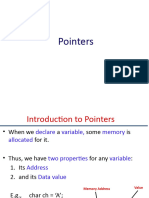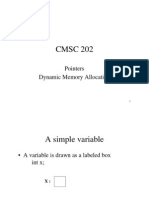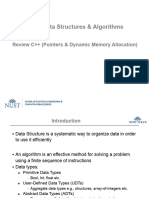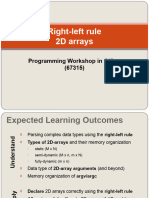0% found this document useful (0 votes)
137 views26 pagesCH-230-A Programming in C and C++ C/C++: Dr. Kinga Lipskoch
The document discusses pointers and dynamic memory allocation in C/C++. It explains how to allocate memory for multi-dimensional arrays using pointers to pointers. Specifically, it shows how to declare a "char **table" pointer to allocate an array of char pointers, with each pointer then allocating memory for a row of char elements. This allows variably sized multi-dimensional arrays to be created and accessed using table[i][j] syntax, with the address calculated as *(table + (i * COL + j)).
Uploaded by
Memet EdenCopyright
© © All Rights Reserved
We take content rights seriously. If you suspect this is your content, claim it here.
Available Formats
Download as PDF, TXT or read online on Scribd
0% found this document useful (0 votes)
137 views26 pagesCH-230-A Programming in C and C++ C/C++: Dr. Kinga Lipskoch
The document discusses pointers and dynamic memory allocation in C/C++. It explains how to allocate memory for multi-dimensional arrays using pointers to pointers. Specifically, it shows how to declare a "char **table" pointer to allocate an array of char pointers, with each pointer then allocating memory for a row of char elements. This allows variably sized multi-dimensional arrays to be created and accessed using table[i][j] syntax, with the address calculated as *(table + (i * COL + j)).
Uploaded by
Memet EdenCopyright
© © All Rights Reserved
We take content rights seriously. If you suspect this is your content, claim it here.
Available Formats
Download as PDF, TXT or read online on Scribd
/ 26























































































